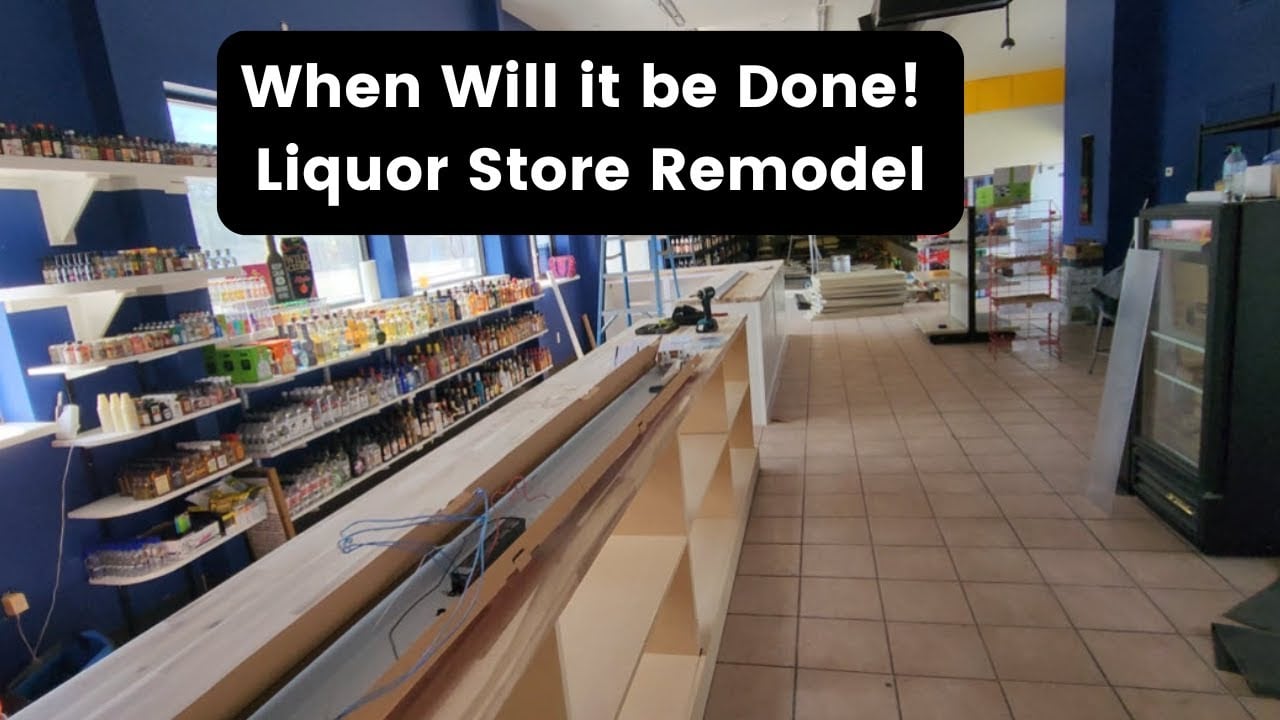
Investing in a Liquor Store: Profitability, Costs, and How it Fits My $100M Mission
On my YouTube channel, I gave you an update on the liquor store remodel I’ve been working on. While that video focused on the specific progress of this store – the new counters, shelving going in, sorting out the layout, and getting the drive-thru ready – it got me thinking more broadly about investing in businesses like this and how it ties into the bigger picture of building wealth and hitting massive goals, like my $100M Mission.
Investing in a liquor store, or any retail business for that matter, is a different beast than buying rental properties or flipping houses, but the core principles of finding value, smart management, and understanding your market remain the same.
Table of Contents
Video: Liquor Store Remodel: Closer and Closer to Opening!
Beyond the Shelves: What it Really Takes to Own a Liquor Store
In the video, you saw some of the physical transformation happening. We’re talking about rebuilding counters, installing shelves, sorting out lighting, and deciding where everything from high-end wines to everyday mixers will go. These might seem like small details, but they’re crucial to the customer experience and the efficiency of the business.
But what about the stuff you don’t see in a remodel video? What does the research tell us about the business side of owning a liquor store?
First off, startup costs can be significant. Research suggests you’re looking at a minimum of $100,000 to get the doors open, and that can go much higher depending on location and the scale of renovations. Licensing and permits alone can run into the thousands, sometimes much more depending on the state and local regulations. This isn’t like getting a landlord license; the alcohol industry is heavily regulated.
Then there’s the ongoing overhead: rent (which can be a big one, especially in high-traffic areas crucial for retail), utilities, staffing, insurance, and technology like a good point-of-sale (POS) system that can handle inventory and sales tracking. Inventory itself is a major upfront and ongoing expense. You need to have enough stock to meet demand, and managing that inventory effectively is key to profitability.
Big Bear Liquors: My Latest Business Acquisition
The Profit Potential and How to Boost It
So, with these costs, is owning a liquor store profitable? The research indicates that it absolutely can be, with typical profit margins ranging from 20% to 30% of revenue, and potentially higher for well-managed stores or those in niche markets.
Several factors play into profitability. Location is huge – high-traffic areas generally mean more customers, though they also mean higher rent. The type of inventory you carry matters; premium spirits and fine wines often have higher markups than beer. Effective pricing strategies are critical; you need to balance being competitive with ensuring healthy margins.
Beyond the basics, there are ways to boost profits. Leaning into a niche, offering unique products customers can’t find elsewhere, or creating a luxury experience can help you stand out from the competition and command higher prices. Encouraging bulk purchases with tiered discounts is another smart tactic. And don’t forget about optimizing for seasonal shifts; stocking up on the right products at the right time of year is crucial.
Efficient operations, like strong inventory management to minimize loss from theft or breakage (known as shrinkage) and analyzing sales data to understand what’s selling and what isn’t, are also vital for the bottom line. Building customer loyalty through programs and good service can lead to repeat business, which is the backbone of any successful retail store.
Business Valuation vs. Real Estate Valuation: Key Differences Investors Should Know
From Liquor Store to $100M Mission
Seeing this liquor store come together is exciting because it represents another asset, another income stream, and another step towards a significant financial goal. Whether it’s real estate or a successful business, the principles of smart investing and hard work apply.
This journey with the liquor store, with all its challenges and opportunities, reinforces why setting big, exciting goals is so important. My $100M Mission isn’t just about hitting a number; it’s about the process, the learning, and the growth that happens along the way. It’s about constantly looking for ways to add value, whether that’s to a property, a business, or even yourself.
If you’re looking to increase your own asset value and achieve ambitious financial goals, I invite you to join me on The $100M Mission. You can follow my progress, learn from my successes and setbacks, and hopefully, be inspired to set and achieve your own massive goals.
Stay tuned for more updates on the liquor store and my mission!
Join me on The $100M Mission!
Get exclusive updates as I work to own $100M real estate by 2030 in today's market. Whether you're just starting out or already investing, you'll get actionable insights from my real-world deals and setbacks.
Plus, I'll help you set and achieve your own ambitious goals. Transform your financial future - subscribe now for weekly updates.
Together, we'll prove that massive success in real estate is still possible.